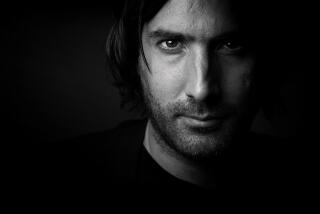A Young Baptist Finds Love : THE PREACHER’S BOY<i> by Terry Pringle (Algonquin Books of Chapel Hill: $15.95; 270 pp.; 0-912697-77-6)</i>
- Share via
This entertaining first novel by the son of a Baptist preacher is more nearly a love story than the Trollopean comedy of small-town fundamentalist manners implied by its press releases. It does begin with a long, irreverent commentary on Abraham’s willingness to sacrifice Isaac, observed from the point of view of the main character, young Michael Page, who sees himself as Isaac:
“He has always had a problem with that story. . . . There the poor kid was, son of Abraham and gift from God to his mother, sitting around wondering why he couldn’t take advantage of his special status, when he heard his father just outside the tent. . . . And the next thing Isaac knew, Abraham was gathering wood and had stuck a dagger in his belt and was saying, “Let’s see, it’s a three-day trip . . . .”
Not much later, Michael appears as the preacher for Youth Day at his father’s church, but breaks into helpless laughter as he tries to tell a parable of faith. He has embarrassed Brother Page, his father, yet again.
Michael is a PK, a preacher’s kid, and he has the complete syndrome: He is unable to avoid questioning the less reasonable tenets of his father’s faith, yet anguished by the fact that the God he wants to worship does not answer prayers, at least not reliably and obviously and without a lot of sophistical adjusting of facts. He is a normal adolescent full of lust and larks, and yet, spied on by the town gossips to a far greater extent than most, he is a lightning rod whose every minor rebellion draws criticism on his father.
Still, the story is basically a love story. The other main character is Amy Hardin, whose fixed goal is to become a singer in a band. In their senior year of high school, Michael and Amy stumble into passionate romance which is off-again, on-again, complicated by Michael’s position as a PK, Amy’s disgust with her mother, Michael’s attraction to other women, Amy’s tendency to neglect their relationship in favor of her budding career, and Michael’s recurring fits of faith that strike him like malaria in the midst of his worldly health. We follow them through graduation, a hilarious senior class party, and into Michael’s studies at a nearby Baptist college. As you would expect in a novel by a preacher’s kid, the sex scenes are great--luscious, funny, tender, and sometimes transcendent.
There is a secondary plot-line involving Michael’s relationship with his father (the two love each other, but in their differences, do not know how to show their love), but the primary suspense is always whether Michael and Amy will be able to stay together.
In spite of stock characters like Michael’s fat, smart, neurotic roommate, Ron from Houston, or Lottie Swenson, the Rumor Queen, who monitors the town through binoculars, most of the characters emerge as real, as worth caring about. His father is a true man of faith, not a mere Bible-thumper. His mother is a sweet and sympathetic woman who quietly eases the impact of Brother Page’s more severe dictums. And Michael and Amy come across like those real nice kids of the neighbors, who are having a bit of trouble right now, but you really hope they work it out.
The book suffers two major problems. The first is that it is often awkwardly written--the sentences just don’t do the job.
This, for example, which is at once coy, clumsy, and awful: “She affected every guy in the school the same way, by inciting madness that resided below his belt.” Or this one: “He tried to maintain his different point of view, noticing the energy released in the singing.”
The second problem is tonal. The book is often very funny, but too much of the humor is delivered in one-liners and stand-up-style patter: “How do you teach a child to be dead to sin and alive to God when all he wanted to do was watch ‘The Courtship of Eddie’s Father’?” On Michael’s qualities as a college student: “. . . Algebra still drove him nuts. X and Y were now even more accomplished in their deceptions and he wouldn’t have been surprised to learn they were Nazi war criminals.”
There is a place for that sort of wit. It might be understandable as voice, the defensive and brittle ironies typical of a young man’s mind--but no real effort is made to construct a voice for Michael. He doesn’t really tell the story, and the tone works against the characters as often as it reveals them, forcing even quite serious action toward farce--a sort of Baptist version of “The Many Loves of Dobie Gillis.”
This is unfortunate, since “The Preacher’s Boy” is a better book than that. In spite of what may be rookie errors, it is often wry, often shrewd, successfully bawdy, and rewardingly gentle, and deserves wide readership.
More to Read
Sign up for our Book Club newsletter
Get the latest news, events and more from the Los Angeles Times Book Club, and help us get L.A. reading and talking.
You may occasionally receive promotional content from the Los Angeles Times.










